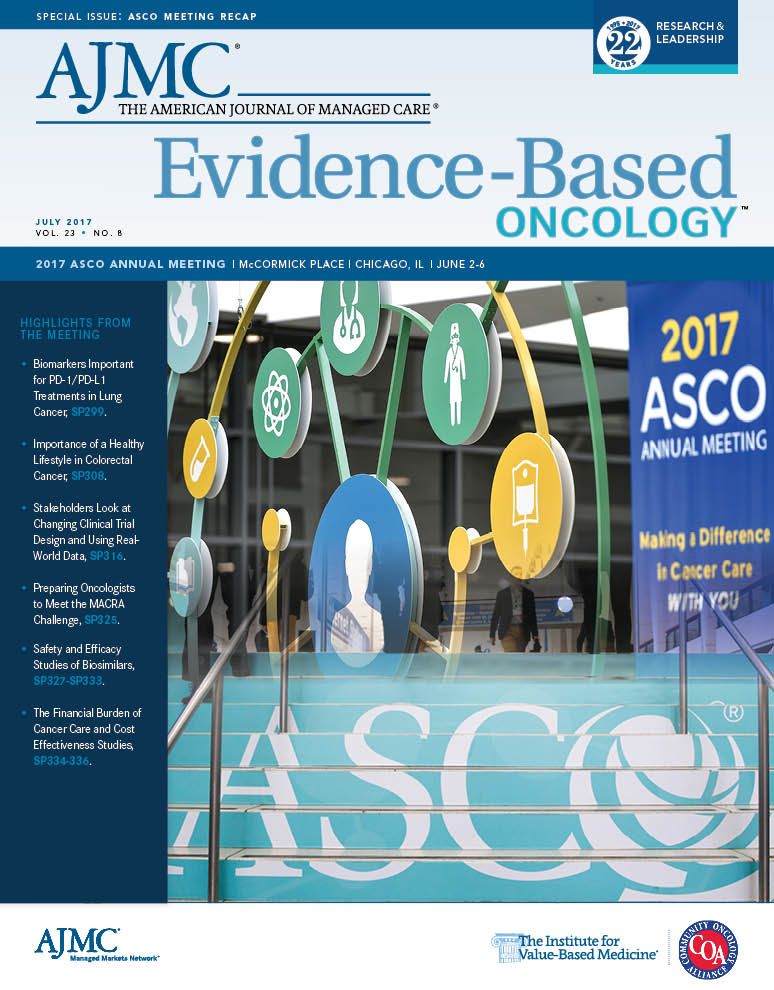- Center on Health Equity & Access
- Clinical
- Health Care Cost
- Health Care Delivery
- Insurance
- Policy
- Technology
- Value-Based Care
Dacomitinib a New First-Line Option for Advanced EGFR Mutation—Positive NSCLC
ARCHER 1050, the first phase 3 head-to-head study of epithelial growth factor receptor (EGFR) tyrosine kinase inhibition, has produced results that demonstrate statistically significant and clinically meaningful improvement with dacomitinib compared with gefitinib (Iressa) as first-line therapy for non—small cell lung cancer (NSCLC) with EGFR-activating mutations.
ARCHER 1050,
the first phase 3 head-to-head study of epithelial growth factor receptor (EGFR) tyrosine kinase inhibition, has produced results that demonstrate statistically significant and clinically meaningful improvement with dacomitinib compared with gefitinib (Iressa) as first-line therapy for non—small cell lung cancer (NSCLC) with EGFR-activating mutations. These results were reported as a late-breaking abstract at the 2017 American Society of Clinical Oncology Annual Meeting.
Data collection for ARCHER 1050, which began in 2013, will be completed in July 2017, with an anticipated study completion date of September 2017. Collection of data for analysis of the primary outcome measure of progression-free survival (PFS) is 18 months after the anticipated first visit by the last subject.1
As reported by Jänne et al in 2014, dacomitinib is a second-generation EGFR tyrosine kinase inhibitor (TKI) with encouraging clinical activity as first-line therapy in patients with EGFR-activating mutation—positive advanced NSCLC.2 NSCLC accounts for approximately 85% of cases of lung cancer and remains difficult to treat, particularly in the metastatic setting. Approximately 75% of patients are diagnosed late with metastatic disease,3 and the 5-year disease survival rate is only 5%.4
EGFR mutations occur in 10% to 20% of nonsquamous NSCLC tumors overall and 35% to 55% of nonsquamous NSCLC tumors in Asian populations.5,6 Patients with EGFR-mutant NSCLC generally experience a PFS of 9 to 13 months when treated with gefitinib or erlotinib (Tarceva), both EGFR TKIs. These treatments, along with afatinib (Gilotrif) are the only targeted therapies available to patients with EGFR-mutant NSCLC.7 However, resistance issues with these agents have resulted in the need for more effective EGFR inhibitors.2
Dacomitinib is a covalent pan-human EGFR inhibitor that has shown clinical activity in patients previously treated with gefitinib or erlotinib.2 An oral, once-daily drug, dacomitinib inhibits HER1/EGFR, HER2, and HER4 irreversibly by binding covalently to the receptor tyrosine kinase domains and preventing autophosphorylation, thereby inhibiting downstream signaling and leading to inhibition of tumor growth and apoptosis.
ARCHER 1050 is the first randomized phase 3 trial that compares dacomitinib with gefitinib as first-line therapy and is being conducted at sites across Asia and Europe. Patients with newly diagnosed stage 3B/4 recurrent NSCLC harboring an EGFR-activating mutation are randomized 1:1 to dacomitinib 45 mg orally every day or gefitinib 250 mg orally every day. Stratification is by race and subtype of EGFR mutation.
The primary endpoint of PFS is determined per blinded independent review analyzed by the Kaplan-Meier method, with log-rank test and Cox model. Secondary endpoints include overall survival (OS), objective response rate (ORR), duration of response, PFS per investigator, time to treatment failure, restricted mean survival time for PFS, safety, and patient- reported outcomes.
The intent-to-treat population included 452 patients with well-balanced baseline characteristics between arms. ORR, per independent review committee, has been similar between arms: 75% (95% CI, 69%-80%) for dacomitinib and 72% (95% CI, 65%-77%; P = .39); OS data is not yet mature.
The most commonly reported grade 3 adverse events with dacomitinib have been dermatitis acneiform (13.7%) and diarrhea (8.4%); with gefitinib, alanine aminotransferase (8.5%). No new safety signals have been identified.
The investigators concluded that the results of ARCHER 1050 have demonstrated statistically significant and clinically meaningful improvement in the efficacy of dacomitinib overgefitinib as first-line therapy for NSCLC with EGFR-activating mutations. The side effect profile has been manageable.
Lead investigator Tony Mok, MD, of the Chinese University of Hong Kong, said, “We changed the treatment paradigm for EGFR-positive lung cancer a few years ago when targeted therapy replaced chemotherapy. This study shows that dacomitinib may be an even more effective treatment for these patients. However, patients should be aware of the need to deal with potential side effects when making treatment decisions.”REFERENCES
1. ARCHER-1050: A Study of Dacomitinib vs. Gefitinib in 1st-Line Treatment of Advanced NSCLC (ARCHER 1050). ClinicalTrials.gov website. clinicaltrials.gov/ct2/show/NCT01774721. Updated April 24, 2017. Accessed June 30, 2017.
2. Jänne PA, Ou SH, Kim DW, et al. Dacomitinib as first-line treatment in patients with clinically or molecularly selected advanced non-small-cell lung cancer: a multicentre, open-label, phase 2 trial. Lancet Oncol. 2014;15(13):1433-1441. doi: 10.1016/S1470-2045(14)70461-9.
3. Tan WW. Non-small cell lung cancer. Medscape website. emedicine.medscape.com/article/279960-overview? pa=lpThjLwOtl2wbhrqb0rGZkC%2F6jD5fTlFokTLaHJO%2FajkOGKiE85QPtczzTC5bckos7CF3wx2Tu- 1U792SxywYLg%3D%3D. Updated June 28, 2017. Accessed June 30, 2017.
4. Lung cancer (NSCLC). Cancer Monthly website. cancermonthly.com/cancer_basics/lung.asp. Accessed June 30, 2017.
5. Pao W, Miller VA. Epidermal growth factor receptor mutations, small-molecule kinase inhibitors, and non—small-cell lung cancer: current knowledge and future directions. J Clin Oncol. 2005;23(11):2556-2568.
6. Mok TS, Wu Y-L, Thongprasert S, et al. Gefitinib or carboplatin—paclitaxel in pulmonary adenocarcinoma. N Engl J Med. 2009;361(10):947-957. doi: 10.1056/NEJMoa0810699.
7. Smith M. Dacomitinib sets PFS record in phase III NSCLC Trial: next-gen EGFR inhibitor wins head-to-head battle with gefitinib, at least for efficacy. Medpage Today website. medpagetoday.com/meetingcoverage/ asco/65818. Published June 6, 2017. Accessed June 30, 2017.


